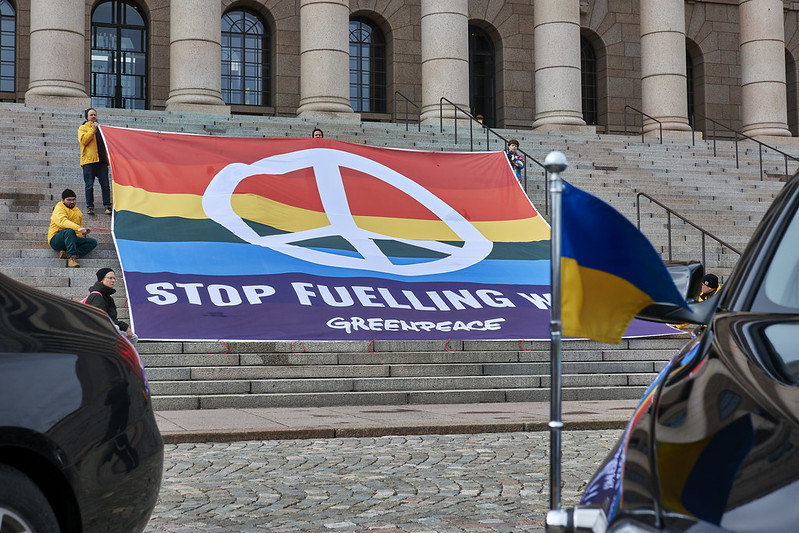A New Chapter: Greenpeace in Kyiv
 Greenpeace has established its first office in Kyiv amid ongoing conflict, committing to support Ukraine’s green reconstruction. The environmental NGO links peace prospects with the country’s environmental rehabilitation, emphasizing that sustainable energy fosters a sustainable future. Natalia Gozak, office director of Greenpeace Ukraine, highlighted the importance of transitioning to green technologies during the office’s opening on Sept. 10.
Greenpeace has established its first office in Kyiv amid ongoing conflict, committing to support Ukraine’s green reconstruction. The environmental NGO links peace prospects with the country’s environmental rehabilitation, emphasizing that sustainable energy fosters a sustainable future. Natalia Gozak, office director of Greenpeace Ukraine, highlighted the importance of transitioning to green technologies during the office’s opening on Sept. 10.
Greenpeace Ukraine’s Mission and Challenges
In an interview with the New Humanitarian, Natalia outlined the three pillars of Greenpeace’s mission: The sustainable and green reconstruction of infrastructure. Incorporating solar panels, heat pumps and green technologies into regeneration projects is vital to the longevity of Ukraine’s recovery. The monitoring of nuclear sources and power plants, with particular focus on the Zaporizhzhia nuclear power plant, which is now occupied by Russian forces. The investigation into environmental crimes, such as the occupation of nuclear sites, threatens further environmental disasters. Nuclear energy sources could be weaponized as forms of warfare.
Economic Implications and Political Scrutiny
The cost of Ukraine’s reconstruction being estimated by the World Bank to have grown to $411 billion. It is now vital that such reconstruction projects have sustainable foundations as Gozak has pledged to be a role model for rebuilding devastated societies in as green a way as possible. Through advocating for the sustainable rehabilitation of Ukraine, Greenpeace has also exposed itself to political scrutiny and intimidation. The Russian Prosecutor General’s Office designated Greenpeace as ‘undesirable,’ interpreting its work as anti-Russian and threatening to the constitutional system and security of Russia.
Greenpeace Frameworks
Greenpeace is building on existing research and projects that advocate sustainable solutions to conflict. Guided by the European Union’s (EU’s) Green Deal, the Lugano Declaration on the Reconstruction of Ukraine committed to the rebuilding of infrastructure in alignment with the goals of the Paris Climate Agreement and 2030 Agenda for Sustainable Development. Ukrainian civil organizations are similarly creating conditions for a green recovery. Environmental NGOs such as Ecoclub Rivne and ro3kvit combine environmental policy with urban planning. The organizations have initiated projects that aim to place sustainability at the heart of reconstruction.
- Ro3kvit. Ro3kvit was founded in March 2022 by a coalition of professors in response to the destruction caused by Russian military aggression. The knowledge and expertise of more than 100 academics have spawned green solutions to rebuilding Ukraine’s urban and rural areas. Studies on other postwar countries have informed their design methods. Projects such as ‘A vision for Mariupol: City strategy’ synthesize memory, identity and ecology in their environmental solutions. Working in partnership with Greenpeace, the project ‘Dnipro River Integrated Vision’ aims to optimize the green and economic potential of the Dnipro River. Indeed, Ro3kvit looks to a post-war future in its projects, creating urban plans that will outlast Russian military aggression.
- Ecoclub Rivne. Ecoclub Rivne has been working as an NGO for more than 20 years and links the sustainable development of society to the development of peace. Through linking sustainability to nonviolence and tolerance, it projects a post-war future for Ukraine that centers on green policy. Its recent Modernisation Partnership project aims to increase the efficiency of energy management in hospitals. This will be achieved by training specialists and disseminating this knowledge among managers. Alongside Greenpeace and other Ukrainian organizations, Ecoclub Rivne has sought solutions to the conflict through a focus on energy efficiency and sustainability.
Looking Ahead
The new presence of Greenpeace in Kyiv highlights a strong commitment to environmentally conscious recovery efforts in Ukraine. Through collaboration with local environmental groups, the focus remains on sustainable reconstruction, green energy initiatives and promoting long-term solutions. The efforts of Greenpeace in Kyiv represent a broader vision for rebuilding a resilient and environmentally secure Ukraine beyond the conflict.
– Lucy Tappin
Lucy is based in Oxford, UK and focuses on Good News and Politics for The Borgen Project.
Photo: Flickr
